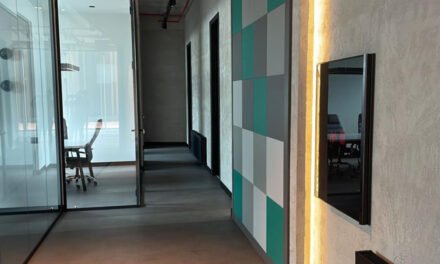
Stoll – a name that inspires and at the same time, stands for quality and flexibility in the world of knitting. The Stoll brand has achieved a legendary reputation equipped with many facets. For more than 140 years, the image of a consequently solution orientated manufacturer of flat knitting machines has been maintained and further developed. Today, for many customers, the Stoll enterprise is the integrative link between the highly sophisticated technology in the area of developing and manufacturing flat knitting machines on the one hand and an innovative independent thinker and developer in the section of Fashion & Technology on the other hand.
Stoll India was initially established as a service centre and was incorporated in 2003 as Stoll Textile Service Centre Private Limited. But subsequent to the restructuring of Stoll India’s operations during 2007, Stoll’s subsidiary in India was rechristened as Stoll India Private Limited with the comprehensive objective of leveraging India’s talented pool of technicians and engineers setting up a strong sales process thereby achieving operational synergy. Since then the company has been successfully operating in Indian market. To know more about company’s journey and future plans for the Indian market, Knitting Views Editor Arvind Kumar recently met and interviewed Norbert Grobe, Director Sales & Marketing (Asia), H Stoll AG & Co. KG and R Saravanan, Director (Sales & Service),Stoll India Private Limited. Given are some excerpts from their conversation.
How has been your experience of working with Indian customers?
Norbert Grobe: Stoll India was initially established as a service center and was incorporated on 31st July 2003 as Stoll Textile Service Centre Private Limited. But subsequent to the restructuring of Stoll India ‘s operations during March 2007, Stoll’s subsidiary in India was rechristened as Stoll India Private Limited with a comprehensive objective of leveraging India’s talented pool of technicians and engineers setting up a strong sales process thereby achieving operational synergy. The company is headquartered in Noida and its corporate and registered office is situated in Mumbai, which is a business hub and considered as the financial capital of India. Stoll India’s Head Quarters in Noida is well rigged with a full- fledged reconditioning plant in addition to well-maintained Training Labs and class rooms for intensive training on Stoll Computerized Flat Bed Knitting machines and patterning systems. Stoll India also has a showroom in Ludhiana along with a well-equipped Training center to impart advanced training to service technicians working in customer locations in Ludhiana. Additionally, we also have a service support center in Tirupur to cater to customers in Southern part of India.
I joined Stoll six months ago but knew Indian customers so far as a buyer. I used to come here for supply chain and sourcing for European mainly German customers. I am very happy to be again in India, which is very different from Bangladesh as people here are very interested and open to do business, making contacts and asking us about our innovations. I see India’s various markets like Ludhiana, Tirupur, Chennai clusters having different requirements. The market is not only limited to garmenting but you can cover almost complete supply chain of textiles and furniture segments. We hope in future more functional and technical textiles companies to adopt our technologies. For this, we are very happy to support them with good machines with the latest in technology.
Is Asia at par with other markets in terms of machines you are selling worldwide?
Norbert Grobe: Worldwide, everything which slows down moves to Asia. We are still selling very high level machines to Canada, Italy and our best market right now is Turkey. Besides, China could be a high technical market in future. Though we can sell high technical machines in other parts also but low labour cost makes moving out much more slower in Asia, which is a big challenge. If you just compare the population Europe has 350 mn and Asia has 40 bn, which is 10 times more. So, in future if retail market and consumer market goes up, there will be a big change in Asian textile market.
What is your advice to the Indian knitters and those planning to get into knitting?
Norbert Grobe: Not only put your basket into newer markets but also try to bring more value to the garments. Fashion keeps on changing, so add value to the garments on a faster pace as per the customer’s demand. Invest as per trend in other areas of knitting also. I know a factory which makes knitting parts for shoes in one go. So here’s a big chance, if a customer is interested to enter footwear market to make uppers that could be a big market for them. Today, 90 per cent German factories making shoes use upper made in knitting factories. Fashion market, shoes and upper market, technical textiles, and technical applications etc. are step-by-step booming. We have to support innovators, start material research, construction research, application research, conductive yarn, heating, cooling, and a lot of application.
R Saravanan: We were disappointed initially when we have donated some of our machines to one institute in Delhi for training and research, but the machines were not maintained properly. Same thing happened in Ludhiana where proper maintenance was not done again. We are open to help the students, but want proper response from the other side too. Because in India if anything is given free for facilitating research, then it’s absolutely neglected and no maintenance is done. We are open to projects where there is seriousness and work towards the initiative properly.
How was 2017 for Stoll in India and also in Bangladesh?
How do you look at 2018, as it’s a challenge now?
Norbert Grobe: 2017 was one of the best years for Stoll in India and Bangladesh. Despite of lots of ups and downs in the industry, it was one of the best years for us. R Saravanan: Last year we delivered around 800 machines to the market, but largely because of two major projects which had come to us. As you know any large project needs a settling time of one or two years before they further add more machines. So, this year we are more focused to the small and medium projects and expect to sell around 250 to 300 machines. This is our target and we will work hard to achieve it.
In India do you see expansion of domestic market or re-exports?
Norbert Grobe: We are looking at both because we never put our focus on one market. Exports have been growing but we always kept our size in organised retail. Till eight years back, the cream of the retail brands used to source very few garments from our customers. Hardly 10 per cent of their sale was of flat knitted goods. But over the years, more than 30-40 per cent of their product today is sold from our customers. In fact Madura has installed one of our machines inside their office in Bangalore for R&D. We have customers who buy two machines normally and also those who buy 100 machines. We are taking care of all our customers from small to everyone giving our best possible pre-sales and after-sales service to them. Our future plan is to set-up global training center here. People can wisely and very easily come to get training here from all over the world. So, we will keep on training new people constantly.

After talking the charge what are your plans to expand your market share in India?
Norbert Grobe: I have the complete responsibility for Asia and right now going very deep into the market. It’s not only potential of the market but how much is the percentage of per head income, where’s the future, where are the logistics moving, basically complete information about this market. I want to be specific here as different marketing measures are needed for each country because each of them needs individual attention. I have to analyze what is three four five years ahead in all these places for Stoll.
Do you think India can take China’s little bit share when it comes to garmenting?
Norbert Grobe: We have to look little bit into product and population. Still low cost garment orders will go to countries with higher population like Bangladesh due to cheap labour cost. Then we have niche markets like Cambodia and Vietnam, Myanmar where we have limited part of workforce but they still are on a quite low level. So, it’s like Caravan which goes from Europe to North America, Korea, Japan, Hong Kong, China to other markets. To keep our existing market growing and to explore the newer markets will be our challenge for future. Right now our existing customers need more special care. At the same time we have to build up new markets or new challenges.
Is Stoll’s performance in India stronger because of the domestic market?
Norbert Grobe: Yes. We have two categories, one working for the domestic brands and other is for the exports. Last year we have also delivered more machines than ever to the domestic market and this is a good sign that India as a country is doing very good in domestic market.
Has GST impacted your company or price of its products offerings?
R Saravanan: One way it’s OK, as certain orders were postponed as customers were busy implementing GST at their companies. In future GST may help us but as of now there’s confusion, but we hope things to settle down soon. As far as cost of machine is concerned it has gone up as govt. has restructured the duties. Basically, customers have to invest more but over a period of time they can get it back. So, of course initial investment has increased.
What is in trend now in terms of machinery in India?
Norbert Grobe: When we started in India, we used to sell 80 per cent of the re-conditioned machines, because customers wanted investment in a very specific budget, and they were not very worried about getting the latest technology. But their aim was to run the machines basically properly, and didn’t have trained workforce and had one particular model which they were comfortable with. So when we started we identified this, for almost three years we trained people on our latest machines. We kept on educating them that they have to look forward as we were there to support them. So, in certain cases when we delivered the latest technologies we have given the support for and train more people on latest machines, and we kept on educating the customers to look forward but we are here to support you. So, in certain cases when we delivered the latest technologies we have to support for six-eight months because the operator, master, programmer were new. Slowly in three-four years due to our hard work of generating more people to adapt latest technologies paid off. Now, we sell around 80 per cent new machines and 20 per cent re-conditioned machines. Our focus is to really get into 100 per cent new machines. There are still certain areas because any customer who is coming from Hand Flat can go for a high level technology like Stoll which has so many features.
We are happy at least that many of the customers have moved out of hand flat technologies. Even the re-conditioned machines we are selling are only to very new segment or a new customer who is investing. Otherwise most of the domestic customers who only used to buy reconditioned machines have shifted to buying new machines. What we are selling now in India are CMS 502HP+ which is our entry level model, CMS 530 HP our advanced model, CMS 822 HP for wider width & home furnishings, and then the latest ADF. Now, all these technologies are working in India; though for the ADF technology, we had little but hesitance from customers as there was confusion whether they would be able to adapt such high level technologies. But with pursuance in last one year we were able to get five projects. India is now not holding back on one particular model, the industry has to do value added garments to export to compete with Bangladesh. So we are selling almost all our latest models here now.
How do you compare India and Bangladesh markets?
Norbert Grobe: In Bangladesh, business is still based in one big city which is stuck up. Though now it’s getting into sub-urban areas but still it’s a cost to make business here. Infrastructure is also a big issue there. When it comes to India, on one hand infrastructure is a problem, on the other there is a big demand for artificial fibres coming in. Even we have big history of yarn, technical yarn. When compared to China or India, it is tougher to get goods into Bangladesh. In India, if I have a good partner I will not have any problem in getting my shipments orders. Bangladesh has lots of bureaucracy though it’s not there in India but still not satisfactory. In future we have to work on Bangladesh and India both as these are important and emerging markets. We are very happy to be here in India and having a very good team.
Bangladesh is a bigger market in terms of machines sold and also generating business by selling a lot of entry model machines. In India there’s huge interest of buyers in our latest machines.
Is there anything which you think your Indian customers are lacking and should be doing to compete in the world market?
Norbert Grobe: In last year 10 years China was a huge exports market, which now has turned into huge local market. This is effective right now as well. We don’t have customer in India which are doing both as either they are concentrating on exports or the local market. I am open to both in approaching new customers as they need more information and enlarge their knowledge about setlines. Exporters are looking at compliance rudiment but domestic players not much. Infrastructure, transparence, fair development is happening everywhere.
How do you look at trend in India about the investment happening in flat knitting machines especially?
Norbert Grobe: Positive trend. I can proudly say that more than 80 per cent of the computerised flat knitting machines available in India be it new, used, re-conditioned or refurbished are from Stoll. Now those who are using hand knitting machines till date are upgrading with computerised machines, most of them are starting with reconditioned machines. But, well, the change has started and this is a very good sign for us. India has a great future; it is growing strong steadily and continuously!
Is Stoll manufacturing both in China and Germany today?
R Saravanan: Yes. Except for model CMS 502 HP+, all the other machine models from Stoll are made in Germany only. We are making only the entry level model in China, which is also assembled there, because most of the parts are initially from Germany.
Any plan for expansion in terms of production?
R Saravanan: Yes. Except for model CMS 502 HP+, all the other machine models from Stoll are made in Germany only. We are making only the entry level model in China, which is also assembled there, because most of the parts are initially from Germany. Any plan for expansion in terms of production? Norbert Grobe: We always have plans to increase our production, but everything depends on market demand. We are very positive about Indian market and our future here.





















